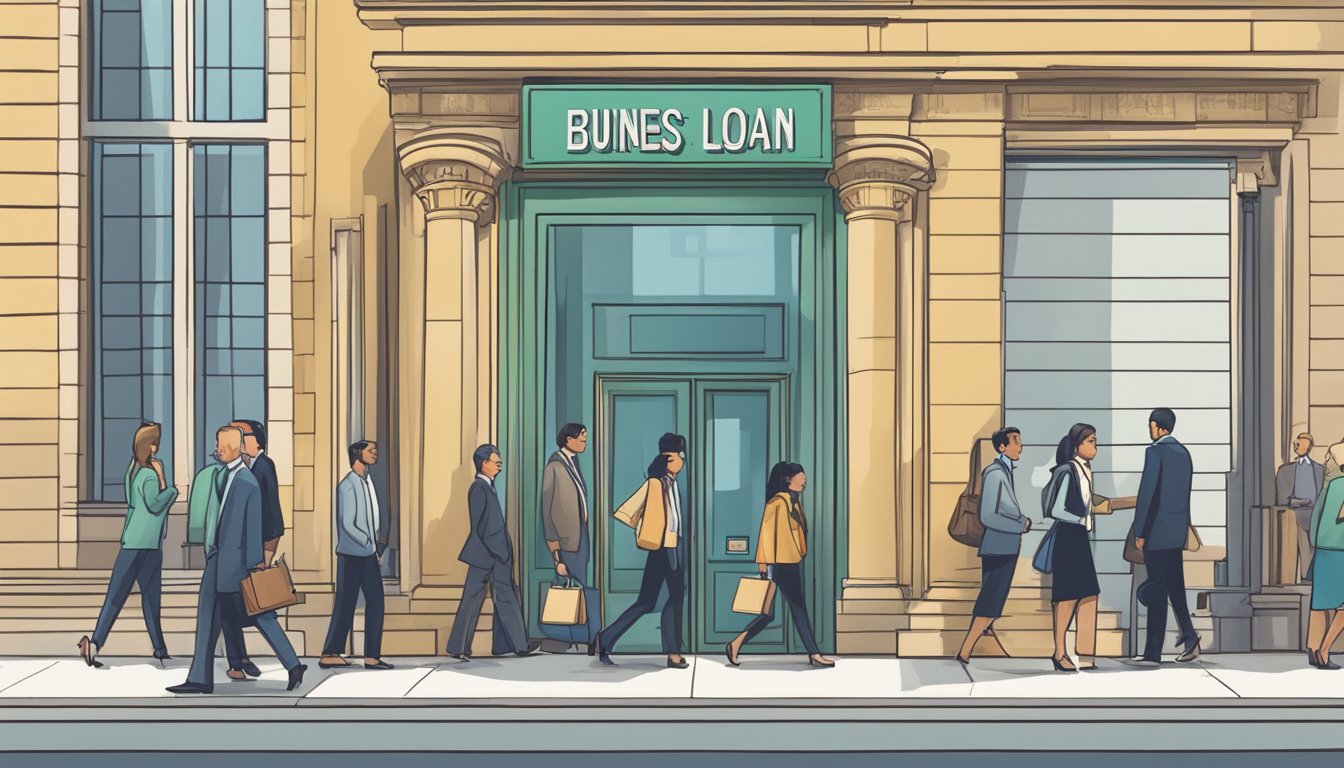
If you’re a business owner, you may have considered taking out a bank loan to help finance your enterprise. However, before you sign on the dotted line, it’s important to understand the interest rates associated with business bank loans. Interest rates can have a significant impact on the overall cost of a loan, so it’s essential to secure the best rate possible to avoid overpaying.
Understanding Business Bank Loan Interest Rates
Business bank loan interest rates can vary widely depending on the lender, the type of loan, and the borrower’s creditworthiness. Generally, interest rates for business loans are higher than those for personal loans due to the higher risk involved. However, interest rates can range from as low as 7% to as high as 20% or more, depending on the factors mentioned above. It’s important to shop around and compare rates from different lenders to find the best deal.
Securing the Best Loan for Your Enterprise
To secure the best loan for your enterprise, it’s important to do your research and compare rates from different lenders. You should also consider your credit score, which can have a significant impact on the interest rate you’re offered. If you have a good credit score, you may be able to negotiate a lower rate with your lender. Additionally, you should consider the terms of the loan, such as the repayment period and any fees associated with the loan.
Key Takeaways
- Business bank loan interest rates can vary widely depending on the lender, the type of loan, and the borrower’s creditworthiness.
- To secure the best loan for your enterprise, it’s important to do your research and compare rates from different lenders.
- Your credit score can have a significant impact on the interest rate you’re offered, so it’s important to maintain a good credit score.
Understanding Business Bank Loan Interest Rates

If you’re a business owner looking to take out a bank loan, understanding the interest rates is essential. Interest rates are the percentage of the loan amount that you’ll pay the lender in exchange for borrowing the money. In this section, we’ll explore what determines your interest rate, the difference between EIR and flat interest rates, and the impact of loan tenure on interest rates.
What Determines Your Interest Rate?
The interest rate you’ll be charged on your business bank loan is determined by several factors. One of the most important factors is your credit score. A good credit score will usually result in a lower interest rate, while a poor credit score will result in a higher interest rate. Other factors that can impact your interest rate include the amount of the loan, the loan tenure, and the level of risk share between you and the lender.
Comparing EIR and Flat Interest Rates
When comparing business bank loan interest rates, you’ll often come across two different types of interest rates: EIR and flat interest rates. EIR stands for effective interest rate and is the true cost of borrowing. It takes into account all fees and charges associated with the loan, as well as the interest rate. Flat interest rates, on the other hand, only take into account the interest rate and not any fees or charges. When comparing loans, it’s important to compare the EIR rather than just the flat interest rate.
The Impact of Loan Tenure on Interest Rates
Loan tenure refers to the length of time you have to repay the loan. The longer the loan tenure, the lower your monthly repayments will be, but the higher the total interest you’ll pay over the life of the loan. Shorter loan tenures will result in higher monthly repayments, but you’ll pay less interest overall. When deciding on a loan tenure, it’s important to consider your business’s cash flow and ability to make repayments.
In summary, interest rates are an important consideration when taking out a business bank loan. Your interest rate will be determined by several factors, including your credit score, loan amount, loan tenure, and risk share. When comparing loans, it’s important to compare the EIR rather than just the flat interest rate. Finally, the loan tenure you choose will have an impact on your monthly repayments and the total interest you’ll pay over the life of the loan.
Securing the Best Loan for Your Enterprise

As an SME owner, you may be looking for ways to secure financing to support your business operations. There are various financing options available to you, and it can be overwhelming to decide which one is best for your enterprise. In this section, we will explore the different financing options available and provide insights on how to navigate government-assisted schemes.
Exploring Various Financing Options
When it comes to securing a business loan, there are several financing options available to you. Some of the most common types of loans include SME working capital loans and business term loans. It is essential to understand the difference between these types of loans to determine which one is best for your enterprise.
SME working capital loans are designed to provide short-term financing to SMEs. These loans are typically used to cover day-to-day expenses such as payroll and inventory. On the other hand, business term loans provide long-term financing to SMEs. These loans are typically used to fund expansion projects or purchase equipment.
Navigating Government-Assisted Schemes
The Singaporean government offers various schemes to assist SMEs in securing financing. These schemes are designed to help SMEs access financing at a lower interest rate and with more favourable terms. One such scheme is the SME Working Capital Loan Scheme, which provides financing of up to $1 million to eligible SMEs.
When applying for government-assisted schemes, it is essential to understand the eligibility criteria and application process. Participating financial institutions, such as UOB and OCBC, offer these schemes, and their application and approval process may differ. It is crucial to research and compare the different schemes available to determine which one is best for your enterprise.
Application and Approval Process Insights
When applying for a business loan, it is essential to understand the application and approval process. Most banks and financial institutions require you to submit a business plan and financial statements to support your loan application. You may also be required to pay a processing fee.
It is important to note that the interest rate and loan amount may vary depending on several factors, including your enterprise’s credit score and financial history. It is crucial to have a solid business plan and financial statements to support your loan application and increase your chances of approval.
In conclusion, securing financing for your SME can be a daunting task. However, by exploring various financing options, navigating government-assisted schemes and understanding the application and approval process, you can secure the best loan for your enterprise.
Frequently Asked Questions

How can I calculate the interest rate for a business loan?
Calculating the interest rate for a business loan depends on several factors, including the loan amount, repayment period, and interest rate charged by the lender. You can use loan calculators available on the websites of most banks to determine the interest rate charged on the loan. By inputting the loan amount and loan tenure, you can get an estimate of the interest rate and monthly repayment amount.
What are the current average interest rates for SME loans?
The current average interest rates for SME loans vary depending on the lender, loan amount, and repayment period. According to recent research, the typical interest rate for SME loans ranges from 7% to 12% per annum. However, this rate may vary depending on the creditworthiness of the borrower and the type of loan.
Which banks offer the most competitive interest rates for start-up business loans?
Several banks offer competitive interest rates for start-up business loans. Among them are OCBC, DBS, and UOB. These banks offer interest rates ranging from 3.5% to 9% per annum, making them a popular choice for start-up businesses.
How does the interest rate for a sole proprietorship loan compare to other business loans?
The interest rate for a sole proprietorship loan may vary depending on the creditworthiness of the borrower and the loan amount. However, the interest rate for a sole proprietorship loan is typically higher than that of other business loans due to the higher risk involved in lending to a single individual rather than a company. It is essential to compare the interest rates offered by different banks before applying for a sole proprietorship loan.
What factors influence the interest rates on corporate loans?
Several factors influence the interest rates on corporate loans, including the borrower’s creditworthiness, the loan amount, and the repayment period. The lender may also consider the industry in which the borrower operates and the current economic climate before setting the interest rate. It is essential to maintain a good credit score and provide accurate financial statements when applying for a corporate loan to increase your chances of getting a low-interest rate.
Are there any special interest rate offers for SME Working Capital loans?
Yes, some banks offer special interest rate offers for SME Working Capital loans. For example, UOB offers a promotional interest rate of 2.5% per annum for the first six months of the loan tenure. However, it is essential to read the terms and conditions of the loan before applying to ensure that you understand the interest rates and repayment terms.




